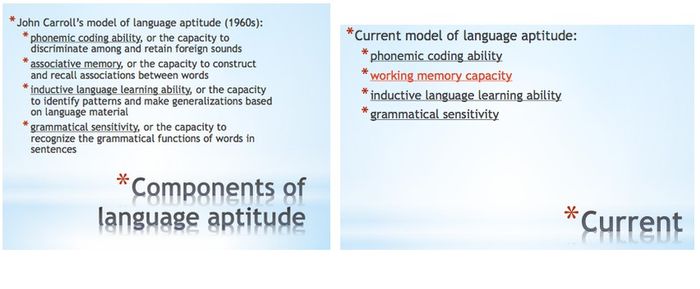Imagine a group of individuals of identical age but all different, immersed in a perfectly uniform educational universe. Their excellent teacher uses a single method for teaching; the individuals all spend the same amount of time on language activities, in the same conditions and with the same motivation. They are thus exposed to the same language acquisition drivers, with the same intensity. Yet, some learn better than others. Why is that?
The explanation to this interpersonal variance is not well known, but it has been given a name: Language Learning Aptitude (LLA). It is, in a way, the explanatory variable of last resort after exhausting all known factors and differentiators. In less scientific parlance, and discarding pathological cases, one would say that a person is more or less talented at learning languages, whereas specialists would point to a higher or lower language learning aptitude.
LLA has been studied for a long time. John B. Carroll, a prominent psycholinguist, was one of the pioneers. He even developed the first test to measure it in the 50s : the MLAT (Modern Language Aptitude Test). This test, still in use in some U.S. government circles, is based on several components: the first one phonemic, the second one related to associative memory, the third one linked to grammatical memory, and the last one addressing inductive learning ability, i.e. the ability to induce rules governing the structure of the language. Other tests exist, one of the most recent ones developed in the early 2000s by Paul Meara. This test also focuses on a set of various ability components: oral, visual, associative, or grammatical inferences.

Language Learning Aptitude is assumed relatively stable over time, once developmental maturity is reached. Not surprisingly, the language proficiency achieved by a learner will be high when their LLA itself is high. The concept is however somewhat controversial, because of the risk of circularity: can the quality of learning in turn increase the LLA ?
In 2008, a team of Swedish researchers led by Abrahamsson looked into the evolution of LLA impact with age. More specifically, is the impact of LLA as important for children as it is for adults? In other words, does it make sense to say that a child is more or less gifted at languages and will this determine their learning ability? An experiment was conducted on 42 Spanish adults, all highly proficient in Swedish. Key detail: 31 of them had learned Swedish in their childhood and the other 11 after puberty. Having all reached adult age, they were subjected to a Language Learning Aptitude test.
As anticipated by the authors of the study, the LLA turned out to be a much better predictor of eventual attainment for adult learners than for children. Those who had learned as adults (and achieved a high proficiency) had a high LLA, whereas the LLA of the successful child learners displayed a high variance amongst individuals. This confirmed the hypothesis that being a child is in itself such an important advantage in language learning that it erases differences in language aptitude. To be precise, LLA differences had indeed been almost entirely neutralized, but not completely – which came as a small surprise.

Abrahamsson therefore concludes that having a high LLA significantly eases the learning of foreign languages for adults, and perhaps gives a little help to children. But looking at the main confirmation of the study, one can answer the question you might be asking yourself: yes, your child is gifted enough for languages, since he or she is a child.
For more information :
Abrahamsson, N., & Hyltenstam, K. (2008). THE ROBUSTNESS OF APTITUDE EFFECTS IN NEAR-NATIVE SECOND LANGUAGE ACQUISITION. Studies in Second Language Acquisition, 30(04), 481–509.





